Items filtered by date: October 2024
Body Pain That Radiates to and From the Feet
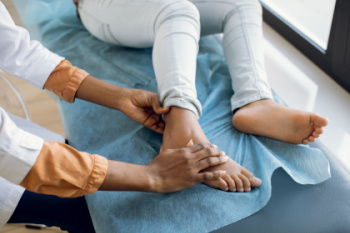
Radiating body pain that affects the feet can stem from several underlying conditions, often linked to nerve compression or musculoskeletal issues. Sciatica, for example, occurs when the sciatic nerve, which runs from the lower back down to the legs and feet, is compressed or irritated, causing sharp or burning pain that radiates to the feet. Herniated discs, spinal stenosis, or pinched nerves in the lower back can also trigger foot pain. Additionally, conditions like peripheral neuropathy, often seen in diabetic patients cause tingling, numbness, or burning sensations that start in the feet and may spread upwards. This type of pain can severely impact mobility and daily functioning, and treatment depends on the underlying cause. If you have foot pain without an obvious cause, it is suggested that you visit a podiatrist who can determine the underlying cause and provide appropriate treatment.
Foot Pain
Foot pain can be extremely painful and debilitating. If you have a foot pain, consult with Deborah Rosenfeld from Rosenfeld Podiatry. Our doctor will assess your condition and provide you with quality foot and ankle treatment.
Causes
Foot pain is a very broad condition that could be caused by one or more ailments. The most common include:
- Bunions
- Hammertoes
- Plantar Fasciitis
- Bone Spurs
- Corns
- Tarsal Tunnel Syndrome
- Ingrown Toenails
- Arthritis (such as Gout, Rheumatoid, and Osteoarthritis)
- Flat Feet
- Injury (from stress fractures, broken toe, foot, ankle, Achilles tendon ruptures, and sprains)
- And more
Diagnosis
To figure out the cause of foot pain, podiatrists utilize several different methods. This can range from simple visual inspections and sensation tests to X-rays and MRI scans. Prior medical history, family medical history, and any recent physical traumatic events will all be taken into consideration for a proper diagnosis.
Treatment
Treatment depends upon the cause of the foot pain. Whether it is resting, staying off the foot, or having surgery; podiatrists have a number of treatment options available for foot pain.
If you have any questions, please feel free to contact our office located in Marlton, NJ . We offer the newest diagnostic and treatment technologies for all your foot care needs.
Orthotic Treatment for Leg Length Discrepancies
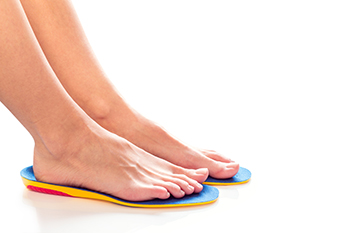
Orthotic insoles can be helpful for people with mild leg length discrepancies, a condition where one leg is slightly shorter than the other. This difference, even if small, can affect how a person walks, causing discomfort or pain. Orthotic insoles are designed to help balance the body and improve how the legs and feet move together. Research shows that using custom orthotics can improve gait symmetry, meaning the walking pattern becomes more even and natural. By leveling out the legs, insoles help reduce immediate pain and discomfort caused by uneven pressure on the feet, knees, hips, and lower back. If you are experiencing foot pain and you know your legs are slightly different lengths, it is suggested that you schedule an appointment with a podiatrist who can provide appropriate treatment, which may include custom orthotics.
If you are having discomfort in your feet and would like to try orthotics, contact Deborah Rosenfeld from Rosenfeld Podiatry. Our doctor can provide the care you need to keep you pain-free and on your feet.
What Are Orthotics?
Orthotics are inserts you can place into your shoes to help with a variety of foot problems such as flat feet or foot pain. Orthotics provide relief and comfort for minor foot and heel pain but can’t correct serious biomechanical problems in your feet.
Over-the-Counter Inserts
Orthotics come in a wide variety of over-the-counter inserts that are used to treat foot pain, heel pain, and minor problems. For example, arch supports can be inserted into your shoes to help correct overarched or flat feet, while gel insoles are often used because they provide comfort and relief from foot and heel pain by alleviating pressure.
Prescription Orthotics
If over-the-counter inserts don’t work for you or if you have a more severe foot concern, it is possible to have your podiatrist prescribe custom orthotics. These high-quality inserts are designed to treat problems such as abnormal motion, plantar fasciitis, and severe forms of heel pain. They can even be used to help patients suffering from diabetes by treating foot ulcers and painful calluses and are usually molded to your feet individually, which allows them to provide full support and comfort.
If you are experiencing minor to severe foot or heel pain, it’s recommended to speak with your podiatrist about the possibilities of using orthotics. A podiatrist can determine which type of orthotic is right for you and allow you to take the first steps towards being pain-free.
If you have any questions please contact our office located in Marlton, NJ . We offer the newest diagnostic and treatment technologies for all your foot and ankle needs.
Causes and Treatment of Bunions
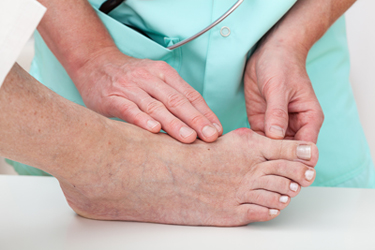
Bunions are bony bumps that form at the base of the big toe, where the joint becomes enlarged and misaligned. This condition develops when the big toe pushes against the toes next to it, forcing the joint to protrude outward. Bunions are often caused by genetic predisposition, wearing tight or high-heeled shoes, or conditions like arthritis that affect joint health. Over time, the joint inflammation can lead to secondary osteoarthritis, causing pain, stiffness, and swelling. Bone spurs may also form, adding to the discomfort. Common symptoms include pain, swelling, redness, and difficulty wearing shoes due to the enlarged joint. As the condition worsens, mobility can become limited. Treatment options vary based on severity. Conservative methods include wearing wide-toed shoes and using orthotics. In more advanced cases, surgery may be needed to realign the joint and relieve symptoms. If you have a painful bunion, it is suggested that you consult a podiatrist to assess the severity and provide appropriate treatment.
If you are suffering from bunion pain, contact Deborah Rosenfeld of Rosenfeld Podiatry. Our doctor can provide the care you need to keep you pain-free and on your feet.
What Is a Bunion?
Bunions are painful bony bumps that usually develop on the inside of the foot at the joint of the big toe. As the deformity increases over time, it may become painful to walk and wear shoes. Women are more likely to exacerbate existing bunions since they often wear tight, narrow shoes that shift their toes together. Bunion pain can be relieved by wearing wider shoes with enough room for the toes.
Causes
- Genetics – some people inherit feet that are more prone to bunion development
- Inflammatory Conditions - rheumatoid arthritis and polio may cause bunion development
Symptoms
- Redness and inflammation
- Pain and tenderness
- Callus or corns on the bump
- Restricted motion in the big toe
In order to diagnose your bunion, your podiatrist may ask about your medical history, symptoms, and general health. Your doctor might also order an x-ray to take a closer look at your feet. Nonsurgical treatment options include orthotics, padding, icing, changes in footwear, and medication. If nonsurgical treatments don’t alleviate your bunion pain, surgery may be necessary.
If you have any questions, please feel free to contact our office located in Marlton, NJ . We offer the newest diagnostic and treatment technologies for all your foot care needs.
How Diabetes Can Affect the Feet
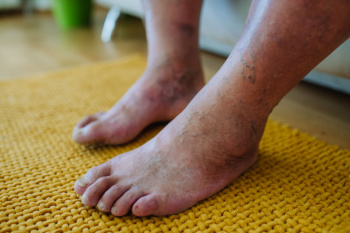
Diabetes can have serious effects on the feet due to poor circulation and nerve damage, known as diabetic neuropathy. Reduced blood flow to the feet can delay the healing of cuts, blisters, or sores, increasing the risk of infections and, in severe cases, leading to ulcers or even amputation. Neuropathy can cause a loss of sensation in the feet, making it harder to detect injuries or changes in skin condition, which can go unnoticed and worsen over time. A podiatrist plays a critical role in diabetic foot care. They can perform regular foot exams to identify problems early, treat wounds, and recommend proper footwear or custom orthotics to prevent pressure points. Podiatrists also offer guidance on daily foot care routines, such as inspecting feet for sores and maintaining good hygiene. If you have diabetes, it is strongly suggested that you schedule routine podiatric visits to help manage diabetes-related foot complications and reduce the risk of serious issues.
Diabetic foot care is important in preventing foot ailments such as ulcers. If you are suffering from diabetes or have any other concerns about your feet, contact Deborah Rosenfeld from Rosenfeld Podiatry. Our doctor can provide the care you need to keep you pain-free and on your feet.
Diabetic Foot Care
Diabetes affects millions of people every year. The condition can damage blood vessels in many parts of the body, especially the feet. Because of this, taking care of your feet is essential if you have diabetes, and having a podiatrist help monitor your foot health is highly recommended.
The Importance of Caring for Your Feet
- Routinely inspect your feet for bruises or sores.
- Wear socks that fit your feet comfortably.
- Wear comfortable shoes that provide adequate support.
Patients with diabetes should have their doctor monitor their blood levels, as blood sugar levels play such a huge role in diabetic care. Monitoring these levels on a regular basis is highly advised.
It is always best to inform your healthcare professional of any concerns you may have regarding your feet, especially for diabetic patients. Early treatment and routine foot examinations are keys to maintaining proper health, especially because severe complications can arise if proper treatment is not applied.
If you have any questions please feel free to contact our office located in Marlton, NJ . We offer the newest diagnostic and treatment technologies for all your foot and ankle needs.
Do Your Child's Feet Hurt?
What Are Hallux Valgus and Hallux Rigidus?
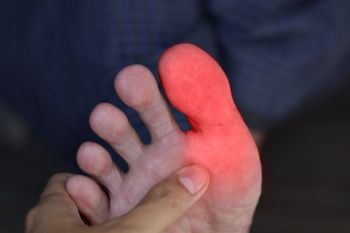
Hallux valgus and hallux rigidus are two different conditions affecting the big toe. Hallux valgus, commonly known as a bunion, is a deformity where the big toe deviates outward, causing the joint to protrude. It often results from wearing improper footwear, genetics, or arthritis, leading to pain, swelling, and difficulty wearing shoes. Hallux rigidus is a form of arthritis where the joint at the base of the big toe stiffens, limiting movement. Unlike hallux valgus, which involves deformity, hallux rigidus focuses on joint stiffness and decreased mobility. In terms of pain, both conditions can be quite painful, but hallux rigidus may be more limiting due to the loss of motion. Surgery may be required for either condition if conservative treatments do not provide relief or if the pain severely impacts daily activities. If you have pain in your big toe, it is suggested that you consult a podiatrist for a diagnosis and treatment that is deemed right for you.
Arthritis can be a difficult condition to live with. If you are seeking treatment, contact Deborah Rosenfeld from Rosenfeld Podiatry. Our doctor can provide the care you need to keep you pain-free and on your feet.
Arthritic Foot Care
Arthritis is a term that is commonly used to describe joint pain. The condition itself can occur to anyone of any age, race, or gender, and there are over 100 types of it. Nevertheless, arthritis is more commonly found in women compared to men, and it is also more prevalent in those who are overweight. The causes of arthritis vary depending on which type of arthritis you have. Osteoarthritis for example, is often caused by injury, while rheumatoid arthritis is caused by a misdirected immune system.
Symptoms
- Swelling
- Pain
- Stiffness
- Decreased Range of Motion
Arthritic symptoms range in severity, and they may come and go. Some symptoms stay the same for several years but could potentially get worse with time. Severe cases of arthritis can prevent its sufferers from performing daily activities and make walking difficult.
Risk Factors
- Occupation – Occupations requiring repetitive knee movements have been linked to osteoarthritis
- Obesity – Excess weight can contribute to osteoarthritis development
- Infection – Microbial agents can infect the joints and trigger arthritis
- Joint Injuries – Damage to joints may lead to osteoarthritis
- Age – Risk increases with age
- Gender –Most types are more common in women
- Genetics – Arthritis can be hereditary
If you suspect your arthritis is affecting your feet, it is crucial that you see a podiatrist immediately. Your doctor will be able to address your specific case and help you decide which treatment method is best for you.
If you have any questions, please feel free to contact our office located in Marlton, NJ . We offer the newest diagnostic and treatment technologies for all your foot care needs.


